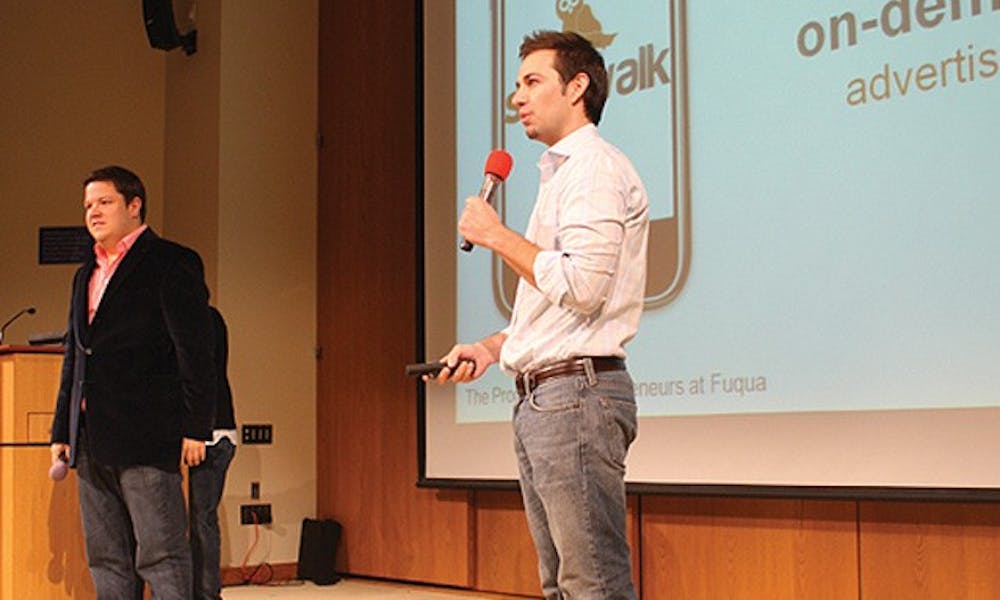Using only a PowerPoint presentation and a few props, dozens of Duke student teams had exactly one minute to woo the judges with their business proposals in the 5th annual Elevator Pitch Competition.
Of the 66 initial teams, 18 groups delivered their pitches in the final round Friday, and four undergraduate teams emerged as winners of the four awards. The competition was the first main event in the Duke Start-Up Challenge, the student-led entrepreneurship contest that runs from November to April.
“[The competition] must have tripled in student involvement,” said Jon Fjeld, a judge in the preliminary contests and executive director of Duke’s Center for Entrepreneurship and Innovation. “There is huge enthusiasm, a lot of energy and it’s a wonderful outlet for students to express not just business ideas but their creativity as well.”
Senior Cliff Satell won the judges’ choice prize, the $5,000 top honor, with his business project “Nooch,” a peer-to-peer version of PayPal that aims to facilitate monetary exchange on a consumer level. Satell declined to comment for this article.
Pitched by senior Cheney Tsai, the updated course recommendation system Advisync won the audience choice prize, which was determined by audience members and online viewers via text message. CarBone, which utilizes bones as source material for batteries, earned the judges’ choice runner up, and ShelfRelief.com, a website designed to cut textbook costs, won its creators the best pitch delivery award.
The final 18 teams were the winners of eight different qualifying track competitions held throughout the week, including energy and environment; information technology and media; women-led startups; and undergraduate-led startups.
“For the most part, there were some really stellar ideas and teams,” said Meghan Gallagher, co-president of the organizing committee for the Duke Start-Up Challenge and a second-year student at the Fuqua School of Business. “The common feedback from the judges was that they had a hard time picking just one theme, and that’s the best feedback we could get.”
The teams were evaluated on their presentation, organization and communication of their business ideas, Gallagher said.
“An elevator pitch is your classic run-in,” she said. “You want to get the investor to schedule a full meeting with you by hitting them with the impressive points.”
More than 400 people filled Fuqua’s Geneen Auditorium to watch the final round—a substantial increase from the approximately 120 people who attended two years ago, said Howie Rhee, managing director of the Center for Entrepreneurship and Innovation.
Rhee noted that undergraduates made up 29 of the 66 initial teams—the most undergraduate participation in the history of the Elevator Pitch Competition. He said more undergraduates participated in the event’s planning and also mentioned the fact that the winners of last year’s Duke Start-Up Challenge and its $25,000 prize were all undergraduates for the first time.
Although later competitions in the Duke Start-Up Challenge focus more on the actual engineering details of the proposals, this Fall’s contest is based primarily on ideas, said Tsai, who also serves as the director of online design for The Chronicle.
“What the judges are looking for is a need and a solution, and who best gets those points across,” he said.
The next stage of the challenge is the executive summary competition, in which students will be asked to write a two-page summary of a business idea for a $25,000 prize. Participation in the elevator pitch competition is not a prerequisite for entry, but many students decide to elaborate on their initial proposals, Rhee said. Submissions are due Feb. 9, 2011.
Fjeld said he expects an even greater turnout for later events in the Duke Start-Up Challenge.
“There’s a wave of interesting things entrepreneurial, as students are less assured of a great job in investing and banking,” he said. “[The challenge] is not just the latest beer pong social networking event—they’re trying to do serious things while still having fun doing it.”
Get The Chronicle straight to your inbox
Signup for our weekly newsletter. Cancel at any time.

